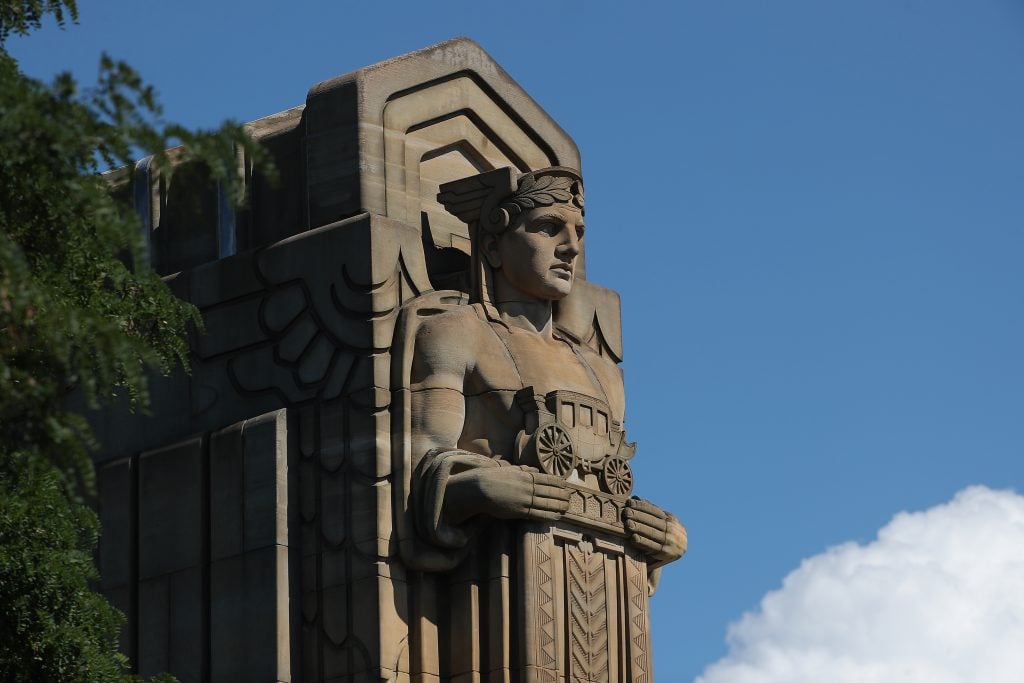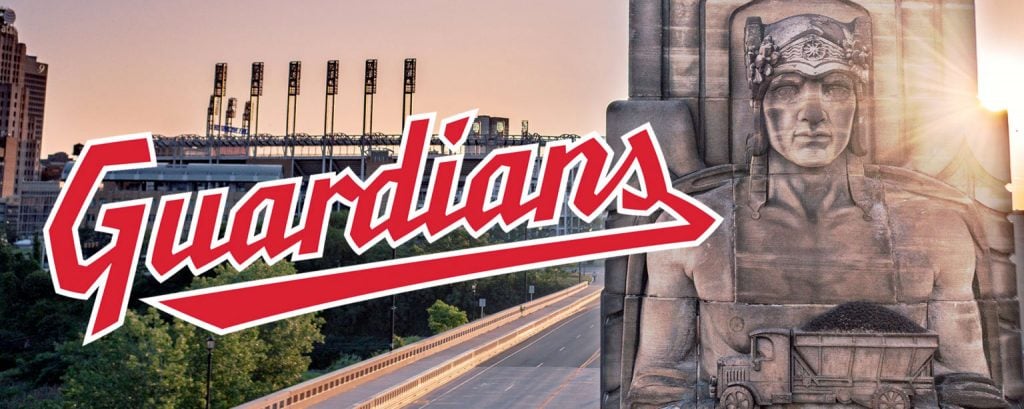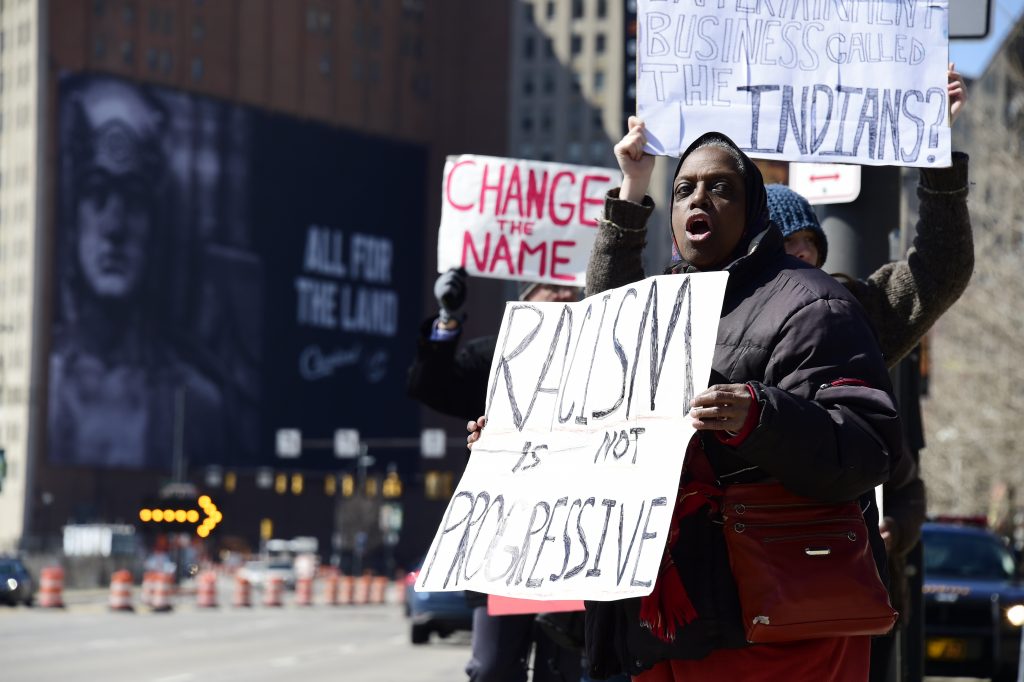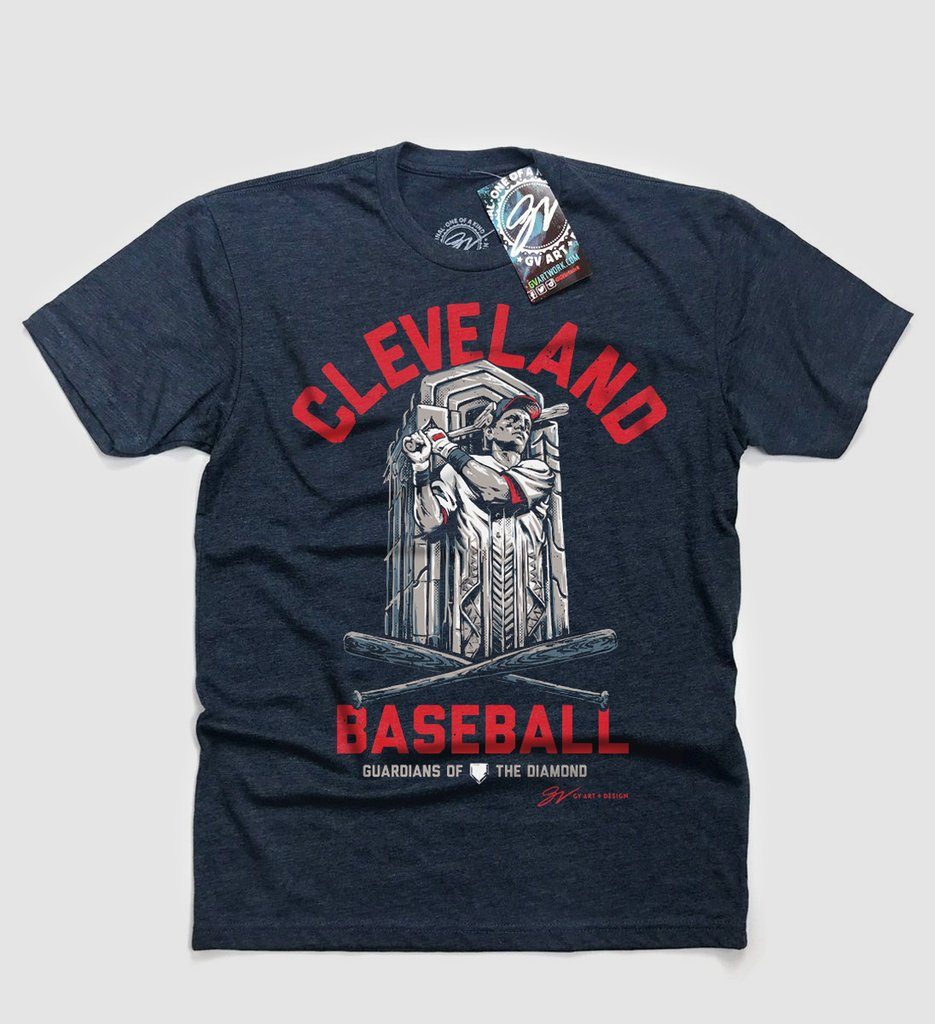Art World
Cleveland Has at Last Renamed Its Baseball Team—and the New Name Pays Homage to Beloved Art Deco Sculptures
After years of protest over the name 'the Indians,' Cleveland looks to public art for inspiration.

After years of protest over the name 'the Indians,' Cleveland looks to public art for inspiration.

Sarah Cascone

Major League Baseball has a new team name, and it comes from an unlikely source: public art. The newly christened Cleveland Guardians take their moniker from a set of monumental Art Deco statues that line the Hope Memorial Bridge leading up to the stadium at Progressive Field.
Named the Guardians of Traffic, the 43-foot-tall Berea sandstone statues flanking either end of the bridge over the Cuyahoga River were designed by sculptor Henry Hering and architect Frank Walker. The bridge itself, which opened in 1932, is named after one of the local stonemasons who carved the statues, William Henry Hope (father of famed comedian Bob Hope).
The eight guardians stand facing opposite directions, sculpted into the four pylons that hold up the bridge’s span. Wearing winged helmets or laurel crowns, and also with wings of their own, they may be modeled after the Greek messenger god Hermes (called Mercury by the Romans) and are a symbol of progress. The sculptures have been called “Northeast Ohio’s most significant Art Deco monuments.”
Each figure holds a different mode of transportation, including a Conestoga wagon, a stagecoach, a 1930s-era automobile, and four types of motorized trucks, promoting Cleveland as a leader in transportation. The team’s new logo is a winged letter “G,” inspired by the statues.

The logo for the renamed Cleveland Guardians, and one of the Guardians of Traffic statues that is the team’s new namesake. Courtesy of Major League Baseball.
“Today, we could choose to view the Guardians as hardworking, robustly proportioned figures who symbolize the dignity of labor. Like caryatids holding up an ancient temple, they’re not afraid to get their hands dirty and carry heavy loads,” wrote Steven Litt on Cleveland.com. “They’re helping the city move on from a team name that carried a whiff, however unintentional, of racism, military violence, and broken treaties perpetrated against Native Americans.”
The decision to rename the team comes amid a reckoning across the U.S. for sport franchises that use Indigenous names and mascots. For decades, Indigenous communities have protested the practice as offensive, rooted in and perpetuating racist stereotypes.

Activists protest against the use of the Cleveland Indians mascot Chef Wahoo prior to the game between the Cleveland Indians and the Chicago White Sox at Progressive Field during the Indians Home Opener on April 1, 2019 in Cleveland, Ohio. In July 2021, the team announced that it would change its name to the Guardians in 2022. In the background, a public art banner featuring one of the Guardians of Traffic, the team’s new namesake can be seen. Photo by Jason Miller/Getty Images.
Cleveland’s team has been called the “Indians” since 1915, though it phased out its controversial Chief Wahoo mascot in 2019. The city’s baseball team was previously known as the Lake Shores (1900), Bluebirds (1901), Bronchos (1902), and Naps (1903–14).
The club considered a list of 1,198 new names. Other potential candidates for the rechristening included the Spiders, after the National League team that folded in 1899 after a decade of play in Cleveland under that name. But it was the Guardians that got the nod.
“We think Guardians is unique and authentic to Cleveland,” Cleveland’s president of business operations Brian Barren told MLB.com.
Together, we are all… pic.twitter.com/R5FnT4kv1I
— Cleveland Indians (@Indians) July 23, 2021
The team announced the name change to the Guardians with a video narrated by local son Tom Hanks that emphasized the need to safeguard the legacy of both the franchise and the city.
“Now it’s time to unite as one family, one community, and build the next era for this team and this city, to keep watch and guard what makes this game the greatest,” Hanks intoned, as the video cut to a shot of the statues standing sentry over the river. Earlier in the clip, a black-and-white shot of one of the Guardian sculptures is featured, showing it under construction in 1927.
Not too long ago, it was the Guardians of Traffic themselves that were in need of guarding: In the ’70s, a county engineer pushed to demolish them in order to add lanes to the bridge. Fortunately, the bridge was added to the National Register of Historic Places in 1976. Decades of dirt and grime on the sculptures were carefully scrubbed away by workers armed with 4,000 pounds of black walnut shells.

‘Guardians of the Diamond’ t-shirt, sold by GV Art + Designs.
In recent years, even before the attention inspired by the name change, natives’ affection for the statues has reportedly been growing. The NBA’s Cavaliers used one of the Guardians in a public art installation in the 2018–19 season, and the figures are increasingly appearing in artworks depicting the city and on merchandise, such as the t-shirts that local Cleveland-themed apparel company GV Art + Design began selling in 2012.
“The Guardians, to us, have always been a hidden gem and sense of pride for the city we love,” the company’s marketing director, Jamie Gregory, told Bloomberg CityLab. “At first, no one understood the Guardians, and many didn’t even know what they were. But over time, they’ve really become a staple and landmark of the city.”